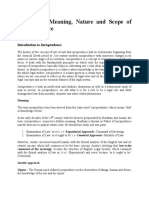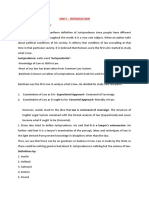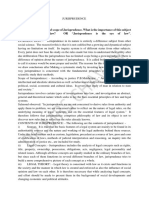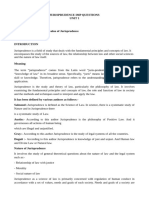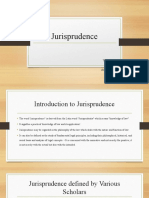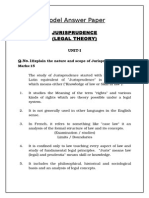0 ratings0% found this document useful (0 votes)
18 viewsJurisprudence 1
Jurisprudence 1
Uploaded by
monkeydketchumThe document discusses the meaning, definitions, nature and scope of jurisprudence. It provides definitions of jurisprudence from various jurists and examines the nature and kinds of jurisprudence as well as its importance and relationship to other disciplines.
Copyright:
© All Rights Reserved
Available Formats
Download as PPTX, PDF, TXT or read online from Scribd
Jurisprudence 1
Jurisprudence 1
Uploaded by
monkeydketchum0 ratings0% found this document useful (0 votes)
18 views19 pagesThe document discusses the meaning, definitions, nature and scope of jurisprudence. It provides definitions of jurisprudence from various jurists and examines the nature and kinds of jurisprudence as well as its importance and relationship to other disciplines.
Copyright
© © All Rights Reserved
Available Formats
PPTX, PDF, TXT or read online from Scribd
Share this document
Did you find this document useful?
Is this content inappropriate?
The document discusses the meaning, definitions, nature and scope of jurisprudence. It provides definitions of jurisprudence from various jurists and examines the nature and kinds of jurisprudence as well as its importance and relationship to other disciplines.
Copyright:
© All Rights Reserved
Available Formats
Download as PPTX, PDF, TXT or read online from Scribd
Download as pptx, pdf, or txt
0 ratings0% found this document useful (0 votes)
18 views19 pagesJurisprudence 1
Jurisprudence 1
Uploaded by
monkeydketchumThe document discusses the meaning, definitions, nature and scope of jurisprudence. It provides definitions of jurisprudence from various jurists and examines the nature and kinds of jurisprudence as well as its importance and relationship to other disciplines.
Copyright:
© All Rights Reserved
Available Formats
Download as PPTX, PDF, TXT or read online from Scribd
Download as pptx, pdf, or txt
You are on page 1of 19
Jurisprudence
Meaning, Definitions, Nature and Scope
INTRODUCTION
•The study of jurisprudence started with the Romans. The term
Jurisprudence is derived from Latin word 'Jurisprudentia' which means
either "Knowledge of Law" or "Skill of law". The word "juris" means
law and prudentia mean knowledge, science or skill. Thus
Jurisprudence signifies knowledge or science of law and its application.
In this sense, Jurisprudence covers the whole body of general legal
principles in the world upon which the actual rules of law are based.
Therefore, it does not mean study of statutes or branches of law like
consumer, crime, tort, property, etc., but the basic principles behind the
development of these statutes and branches of law.
MEANING OF JURISPRUDENCE
•Jurisprudence in its widest sense means. "knowledge of the law" but in its
limited sense evolution and explanation of general principles upon which
actual rules of law are based. It is mainly concerned with the rules of
external conduct which people are compelled to obey. Therefore sometimes
it is said that jurisprudence is that Jurisprudence is that science which gives
us knowledge about "law" but the term law we always use in its abstract
sense i.e. not in the sense of concrete statutes but in the sense of principles
underlying law. Thus, for example, there are various branches of law
existing in the modern legal system such as contract, crime, trust,
properties, companies, labour etc. In jurisprudence, we have to study the
basic principles of each of these branches and we are not concerned with
the detailed rules of these laws. We definitely study these laws in detail
when we study those branches of law separately.
• This may be illustrated further by the example of law of crimes.
Jurisprudence examines the general principles of penal liability but it
does not attempt to detail out the essentials of each offence. In short,
jurisprudence may be considered to the study and systematic
arrangement of general principle of law.
• In yet another sense, jurisprudence may be regarded as the
philosophy of law dealing with the nature and function of law.
• The study of jurisprudence as a separate branch of knowledge stated
with the Romans. For them, jurisprudence meant ‘knowledge of law’.
Roman in practice never confused law with morality or religion.
• The Indian jurisprudence owes its origin to the ancient concept of
Dharma which considered to be the best way to discipline one’s mind.
However, with the passage of time and progress of Indian society, the
concept of law and therefor, of jurisprudence has changed radically.
India is now a sovereign, socialist, secular, democratic republic.
Therefore, citizens are expected to be self-restrained and self-
disciplined. They should also conscious of their rights and duties.
1.Salmond:-Jurisprudence is defined as the Science of Law. In science,
there is a systematic study of Nature and in Jurisprudence there
is a systematic study of Law.By law he meant law of the land or civil law.
2. Austin:- “Science of Jurisprudence is concerned with Positive Laws that
is laws strictly so called. It has nothing to do with the goodness or badness
of law.
This has two aspects attached to it: 1. General Jurisprudence- It includes
such subjects or ends of law as are common to all system. 2. Particular
Jurisprudence- It is the science of any actual system of law or any portion
of it
3.Gray:- Jurisprudence is the study of legal systems of all the countries.
4. Holland- Jurisprudence means the formal science of positive laws. It is
an analytical science rather than a material science.
• The reason for using the word ‘Formal Science’ is that it describes
only the form or the external sight of the subject and not its internal
contents. According to Holland, Jurisprudence is not concerned with
the actual material contents of law but only with its fundamental
conceptions. Therefore, Jurisprudence is a Formal Science.
DEFINITIONS
1.Salmond:-Jurisprudence is defined as the Science of Law. In
science, there is a systematic study of Nature and in Jurisprudence
there
is a systematic study of Law.
2.Austin:- According to this author Jurisprudence is the philosophy of
Positive Law. And it governesses all actions of human being
which are illegal and unjustified.
3.Gray:- According to this author Jurisprudence is the study of legal
systems of all the countries.
4.Duguit :- According to this author Jurisprudence is knowledge of just
and unjust. And Human law and Divine Law or Natural law.
Nature of jurisprudence
1.It is Uncodified Law
2.It is common law in all countries
3.This law has been developed and not enacted by the Legislative.
4.It is also called legal theory, there is an actual study of the term law in
Jurisprudence.
5.There is no scope for amendment and it is developing out of legal
knowledge of the people
• Jurisprudence Is the study of different legal concepts, Like Rights,
Duties Title ,Ownership, Possession ,Legal
Personality ,Intention ,Negligence etc .So we can say ,that it is a
substantive law. It is not a codified. Jurisprudence in its nature is
entirely a different subject from other social science. Its nature is
different from other subject .some jurist says that jurisprudence is as
an art, as a science .as a phiiosophy and social science It is a
substantive law .In the same way jurisprudence is concerned with the
fundamental principles of law and systematic and scientific study of
their methods
SCOPE OF JURISPRUDENCE
• scope of jurisprudence can not be circumscribed. broadly speaking,
jurisprudence includes all concepts oof human order and human
conduct in state and society. In other words, anything that concerns
order in the State and society will be within the domain of
jurisprudence.
• P.B. Mukherjee observed, Jurisprudence is both an intellectual and
idealistic abstraction as well as behavioural study of man in society. It
includes political, social, economic and cultural ideas. It covers the
study of mam in relation to State and society.
1.Jurisprudence and economics:-
• Economics is the science of wealth. People commit many illegal
activities for the sake of wealth and law tries to control illegal
activities and to punish the criminal’s same law is studied in
Jurisprudence and therefore Jurisprudence and economics are
correlated.
2.Jurisprudence and Politics:-
• Laws are enacted by political parties. Who are elected by people
called as Legislatures. Jurisprudence study law enacted by
political parties who are in power and therefore Jurisprudence
is also related with Political Science.
3.Jurisprudence and Sociology :-
• Sociology is also called as Science of Society. It studies about the
development of Society. Law is the requirement of Society. Which is
studied in Jurisprudence and it is related with Sociology.
4.Jurisprudence and Ethics:- (Ethics means Morality)
• Ethics or morality is base of Law. Many Laws have been enacted by
considering morality. But it is not in all the laws. Therefore law and
morality are ethics are also correlated.
• Jurisprudence and Psychology- No human science can be described
properly without a thorough knowledge of Human Mind. Hence, Psychology
has a close connection with Jurisprudence. Relationship of Psychology and
Law is established in the branch of Criminological Jurisprudence. Both
psychology and jurisprudence are interested in solving questions such as
motive behind a crime, criminal personality, reasons for crime etc.
Kinds of jurisprudence
• :- 1) According to Austin :- i) General Jurisprudence ii) Particular
Jurisprudence
• 2) According to Salmond :- i) Analytical jurisprudence ii) Historical
jurisprudence iii) Ethical jurisprudence
• According to Bantham :- i) Expository jurisprudence ii)Censorial
evaluative jurisprudence
IMPORTANCE OF JURISPRUDENCE
1.t is compared with science which shows the importance of Jurisprudence.
2.It studies the legal systems of all the countries.
3.It is called as foundation or base of the law and the study of jurisprudence
is much important.
4.It makes a study of term law and sources of law which is necessary.
5.It is like a tool in hands of legal expertise which is helpful in the
interpretation of the law.
6.jurisprudence helps to put law in its proper context by considering the
needs of the society and by taking note of the advances in related and
relevant disciplines.
• Jurisprudence can teach the people to look if not forward, at least
sideways and around them and realize that answers to a new legal
problem must be found by a consideration of present social needs and
not in the wisdom of the past.
• some logical training is necessary for a lawyer which he can find from
the study of Jurisprudence.
• It helps a lawyer in his practical work. A lawyer always has to tackle
new problems every day. This he can handle through his knowledge of
Jurisprudence which trains his mind to find alternative legal channels
of though
NEED FOR STUDY OF
JURISPRUDENCE
•Julius Stone perfectly defines Jurisprudence. According to him
"jurisprudence is lawyers extraversion". The knowledge of Jurisprudence
sharpens the lawyers own technique of the logical analysis of legal Concepts.
It helps lawyers to set the law in it's proper contours by considering the needs
of the society and by taking note of the advances made in related and relevant
disciplines.
• Holland observed that jurisprudence throw light on the basic ideas and
the fundamental principles of law in a given society. Therefore some of the
jurists call it "eye of law". Jurisprudence helps the judges and lawyers in
ascertaining true meaning of laws passed by the legislature by providing the
rules of interpretation. To become successful lawyer or judge jurisprudential
background is necessary.
• Jurisprudence is also helpful to legislators who play a vital role in
the process of law making. Study of jurisprudence helps them to
understand the technicalities of the law and legal precept. It makes
their job easy and interesting.
• It has great educational value. The logical analysis of legal
concepts widens the outlook of lawyers and sharpens their logical
technique.
• Jurisprudence helps the judges and the lawyers in ascertaining the
true meaning of the laws passed by the legislature by providing
the rule of interpretation. It also furnishes them opportunity to
pinpoint the lacunae, shortcoming and defects in the laws framed
by the legislature and improvise them through their judicial
interpretation.
What is the difference between
jurisprudence and legal theory?
• Jurisprudence, in its simplest form, is the philosophy of law. It
includes the study and analysis of law generally, as well as its systems,
institutions, and principles. Legal theory, meanwhile, focuses
specifically on the law in practice: how it functions and operates
within societies. So while jurisprudence and legal theory are
intrinsically linked, and often used synonymously, one (legal theory)
is actually a subset of the other (jurisprudence).
You might also like
- LLB Jurisprudence NotesDocument41 pagesLLB Jurisprudence NotesKSLU Students86% (36)
- Jurisprudence Note1Document48 pagesJurisprudence Note1Venugopal Mantraratnam100% (4)
- Jurisprudence NotesDocument126 pagesJurisprudence NotesAnirudh Singh100% (9)
- Jurisprudence Class Notes FullDocument68 pagesJurisprudence Class Notes Fulladityatnnls100% (5)
- Meaning and Nature of Jurisprudence' - Purpose and Value of JurisprudenceDocument16 pagesMeaning and Nature of Jurisprudence' - Purpose and Value of JurisprudenceHarshini PrakashNo ratings yet
- Jurisprudence NotesDocument16 pagesJurisprudence NotesAnkur Bhatt100% (7)
- Jurisprudence Notes 2Document26 pagesJurisprudence Notes 2MrityKumar100% (1)
- Nature and Scope of JurisprudenceDocument7 pagesNature and Scope of JurisprudenceShivam Kumar67% (3)
- Jurisprudence - Meaning. Nature & ScopeDocument45 pagesJurisprudence - Meaning. Nature & Scopenivedita.n7No ratings yet
- Unit - I: JurisprudenceDocument70 pagesUnit - I: JurisprudenceSumitb743No ratings yet
- Jurisprudence 1Document71 pagesJurisprudence 1Ayushk5No ratings yet
- Wa0000.Document6 pagesWa0000.ariha0024No ratings yet
- Jurisprudence NotesDocument126 pagesJurisprudence Notes4p94qjrsy6No ratings yet
- Jurisprudence Assignment - NATURE AND SCOPE OF JURISPRUDENCEDocument45 pagesJurisprudence Assignment - NATURE AND SCOPE OF JURISPRUDENCEprakshi100% (1)
- Nature and Scope of JurisprudenceDocument7 pagesNature and Scope of JurisprudencetejNo ratings yet
- Jurisprudence NotesDocument40 pagesJurisprudence NotesKunal Singh86% (21)
- Notes On JurisprudenceDocument78 pagesNotes On Jurisprudencetabishasifi100% (1)
- JurisprudenceDocument78 pagesJurisprudenceDivitaBansal88% (8)
- Jurisprudence Notes - Nature and Scope of JurisprudenceDocument11 pagesJurisprudence Notes - Nature and Scope of JurisprudenceMoniruzzaman Juror100% (4)
- Juris1 PDFDocument66 pagesJuris1 PDFtNo ratings yet
- JURISPRUDENCEDocument134 pagesJURISPRUDENCEkcn451383No ratings yet
- Unit I - Introduction Q - What Is Jurisprudence?: Jurisprudence-Latin Word Jurisprudentia'Document21 pagesUnit I - Introduction Q - What Is Jurisprudence?: Jurisprudence-Latin Word Jurisprudentia'AayushNo ratings yet
- Unit 1Document19 pagesUnit 1KIRANISHTHANo ratings yet
- Kinds of Ownership PDFDocument40 pagesKinds of Ownership PDFseshu187100% (1)
- JurisprudenceDocument44 pagesJurisprudenceamit HCSNo ratings yet
- Jurisprudence Question and AnswerDocument29 pagesJurisprudence Question and AnswerIshrat ShaikhNo ratings yet
- Jurisprudence Class Notes FullDocument68 pagesJurisprudence Class Notes FullConcentrated Hcl100% (1)
- SLOTC09MARCHDocument91 pagesSLOTC09MARCHSRP all rounderNo ratings yet
- Definition of JurisprudenceDocument32 pagesDefinition of JurisprudenceGaurav KumarNo ratings yet
- Jurisprudence Nature and ScopeDocument10 pagesJurisprudence Nature and ScopeNitin DaduNo ratings yet
- LAW 302 Jurisprudence: Course Instructor: Dr. Nabaat Tasnima MahbubDocument8 pagesLAW 302 Jurisprudence: Course Instructor: Dr. Nabaat Tasnima MahbubMd. Umar FarukNo ratings yet
- Jurisprudence - Mod 1Document26 pagesJurisprudence - Mod 1GincyNo ratings yet
- JurisprudenceDocument51 pagesJurisprudenceAyush SemwalNo ratings yet
- Jurisprudence - FinalDocument14 pagesJurisprudence - Finalnaveen.phougatNo ratings yet
- Meaning and Definitions of JurisprudenceDocument2 pagesMeaning and Definitions of JurisprudenceDipansha GargNo ratings yet
- Jurisprudence NotesDocument106 pagesJurisprudence NotesDeepak Ramesh100% (1)
- Jurisprudence PDFDocument40 pagesJurisprudence PDFbikash100% (1)
- IA JurisprudenceUnit1Document12 pagesIA JurisprudenceUnit1Fuwaad SaitNo ratings yet
- IA JurisprudenceUnit1Document20 pagesIA JurisprudenceUnit1Fuwaad SaitNo ratings yet
- Meaning Nature and Scope of JurisprudenceDocument9 pagesMeaning Nature and Scope of Jurisprudencemayank kumar83% (6)
- JurisprudenceDocument45 pagesJurisprudenceRahul parasarNo ratings yet
- Juris Very Imp NotesDocument61 pagesJuris Very Imp NotesAshish parihar50% (2)
- Juris 1Document16 pagesJuris 1Prerna JhaNo ratings yet
- LLB Jurisprudence Notes CompressDocument40 pagesLLB Jurisprudence Notes CompressJirin ArNo ratings yet
- JURIS 1 and Social SciencesDocument21 pagesJURIS 1 and Social SciencesHarshit ChopraNo ratings yet
- Juris 1 IntroductionDocument21 pagesJuris 1 IntroductionHarshit ChopraNo ratings yet
- Meaning Nature and Scope of JurisprudenceDocument9 pagesMeaning Nature and Scope of Jurisprudencevarun vasant100% (1)
- Unit I & Ii - JurisprudenceDocument46 pagesUnit I & Ii - JurisprudenceKratika KhatriNo ratings yet
- My Jurisprudence ProjectDocument16 pagesMy Jurisprudence ProjectKarishma Tamta50% (2)
- Juris m1Document19 pagesJuris m1SURIYA KANNANNo ratings yet
- JurisprudenceDocument45 pagesJurisprudenceNagendra Muniyappa83% (18)
- Jurisprudence IntoductionDocument8 pagesJurisprudence IntoductionJannatun Naem MituNo ratings yet
- Unit 1.1 JurisDocument21 pagesUnit 1.1 Jurisshreyasanand1122No ratings yet
- Jurisprudence IDocument83 pagesJurisprudence Irkmaurya638No ratings yet
- Unit - I: JurisprudenceDocument107 pagesUnit - I: Jurisprudenceﺭﯾﺤﺎﻥ ﺍﻻﺳﻼﻡNo ratings yet
- DocumentDocument4 pagesDocumentPrajwal DhokeNo ratings yet
- Corpus Juris: The Order of the Defender of ArabiaFrom EverandCorpus Juris: The Order of the Defender of ArabiaNo ratings yet
- Introduction to the Study of LawFrom EverandIntroduction to the Study of LawRating: 5 out of 5 stars5/5 (1)
- Looking for Law in All the Wrong Places: Justice Beyond and BetweenFrom EverandLooking for Law in All the Wrong Places: Justice Beyond and BetweenNo ratings yet
- BSC Data Science and Analytics - New Course Advising Form - UpdatedDocument2 pagesBSC Data Science and Analytics - New Course Advising Form - UpdatedmistikwantaNo ratings yet
- Citizen CH-618 Blood Pressure MonitorDocument96 pagesCitizen CH-618 Blood Pressure MonitorCarmenNo ratings yet
- CIVIL ENGINEERING PRACTICE IN NIGERIA AssignmentDocument8 pagesCIVIL ENGINEERING PRACTICE IN NIGERIA AssignmentOMOTOYINBO MICHAELNo ratings yet
- Career Interview AssignmentDocument3 pagesCareer Interview Assignmentatienoj448No ratings yet
- Pagan and Christian Rome by Lanciani, RodolfoDocument248 pagesPagan and Christian Rome by Lanciani, RodolfoGutenberg.orgNo ratings yet
- TSNPDCL AeDocument2 pagesTSNPDCL AeBhanu ChanderNo ratings yet
- AI-10-Resolution StrategiesDocument18 pagesAI-10-Resolution Strategiespany p.gNo ratings yet
- Phpstan: Finding Bugs in Your Code Without Even Running It: Darkmira Tour PHP 2019Document38 pagesPhpstan: Finding Bugs in Your Code Without Even Running It: Darkmira Tour PHP 2019MohsinNo ratings yet
- Sand Production Lecture 1Document20 pagesSand Production Lecture 1Mustafa AlrikabiNo ratings yet
- OZ8953 O2MicroDocument32 pagesOZ8953 O2Microluka2stojanovic-10% (1)
- Copiapó To Mina Cerro Negro Norte CAP, Copiapó - Google MapsDocument1 pageCopiapó To Mina Cerro Negro Norte CAP, Copiapó - Google MapsApromec Ltda LtdaNo ratings yet
- HouzKEY v4 Revised PDS - Jan 2024Document10 pagesHouzKEY v4 Revised PDS - Jan 2024mamatwongNo ratings yet
- Jessica Speairs: ObjectiveDocument2 pagesJessica Speairs: Objectiveapi-655035008No ratings yet
- SAQ 1-ThermodynamicsDocument1 pageSAQ 1-ThermodynamicsFGGHSG SDRFAFAFNo ratings yet
- DVP - HR Professional - Assessment Activity 1 - Carmen Hofmeester - Resubmission2Document7 pagesDVP - HR Professional - Assessment Activity 1 - Carmen Hofmeester - Resubmission2Carmen HofmeesterNo ratings yet
- Hubert SlidesCarnivalDocument27 pagesHubert SlidesCarnivalAntonia PânișoarăNo ratings yet
- Low Cost, Precision IC Temperature Transducer: 8C Max at +258C 8C Max (08C To +708C) 8C To +1058C mA/KDocument8 pagesLow Cost, Precision IC Temperature Transducer: 8C Max at +258C 8C Max (08C To +708C) 8C To +1058C mA/KloidinhNo ratings yet
- Philosophy: Its Meaning and NatureDocument43 pagesPhilosophy: Its Meaning and NatureRhialyn Princess SandovalNo ratings yet
- Zoonotic DiseasesDocument76 pagesZoonotic DiseasesdrdrNo ratings yet
- HVBE Ethics Business Disciplines HRMDocument51 pagesHVBE Ethics Business Disciplines HRMLearner's LicenseNo ratings yet
- Charlene Marie Kinsey: Professional SummaryDocument3 pagesCharlene Marie Kinsey: Professional Summaryapi-402059208No ratings yet
- IEI R3 L19 InfoDocument6 pagesIEI R3 L19 InfoEduardo Ruiz ZapataNo ratings yet
- BMO1 2022 SolutionsDocument16 pagesBMO1 2022 SolutionsАлексей СереденкоNo ratings yet
- Rocket Launched PowerPoint TemplateDocument37 pagesRocket Launched PowerPoint TemplateYosafat Wahyu KurniawanNo ratings yet
- Mcintyre 2011Document15 pagesMcintyre 2011Mauricio RibeiroNo ratings yet
- Durood Taj ShareefDocument3 pagesDurood Taj Shareefmuhammademran_meNo ratings yet
- ORAN - O2 IMS AlignmentDocument7 pagesORAN - O2 IMS AlignmentRandhir kumar SinhaNo ratings yet
- 48 Bible Snacks1 PDFDocument74 pages48 Bible Snacks1 PDFJessica Pollard Adams100% (1)
- SAFe Scrum Master DumpsDocument20 pagesSAFe Scrum Master DumpsDurga PrasadNo ratings yet
- Primary - 6 Geography Chapter - 6Document14 pagesPrimary - 6 Geography Chapter - 6KHAING LYNNNo ratings yet


